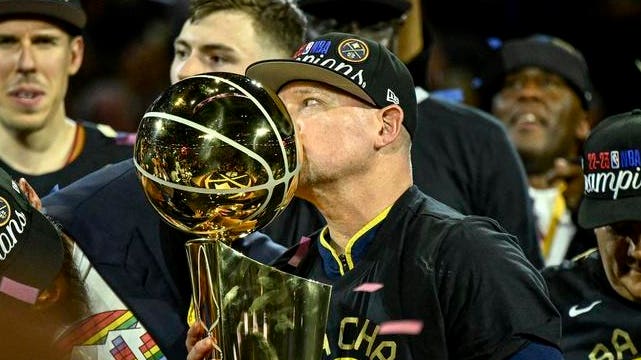As the Denver Nuggets were preparing to do one of the most difficult things in professional sports and close out a finals series against an opponent, their head coach, Mike Malone, uttered some words that anyone who writes and thinks about leadership and high-performing teams hears again and again from the leaders of great organizations.
“My biggest concern going into any close-out game is human nature and fighting against that,” were the words Malone used to describe the challenge his team faced even as they were on the cusp of doing something truly spectacular. “You’re up 3-1. Most teams, when you’re up 3-1, they come up for air. They relax and they just kind of take it for granted that, ‘Oh, we’re going to win this.’”
Yes, Denver had already gone through the likes of Kevin Durant, LeBron James and other greats to get to the NBA Finals against the Miami Heat. But Coach Malone wasn’t concerned about his team’s opponent. He was concerned about their ability to defy human nature and stay focused and hungry when things were going well for them. Even with his team up 3-1 and the whole world announcing that Denver’s time had finally arrived, Malone knew that nothing could kill a championship run like celebrating too early or letting off the gas before the final whistle.
The Denver players clearly heard their coach’s message because, on Monday night, they finished the job in a choppy and hard-fought contest in which they prevailed 94-89. And as the Denver faithful were celebrating in the stands in Denver’s Ball Arena and the confetti fell on everyone, Malone announced to the cheering throngs, “I got news for everybody out there. We’re not satisfied with one! We want more! We want more!”
The great ones always do, but Malone’s approach to Denver’s historic first Championship recalled the mindset of another great coach. Some years ago, I interviewed Penn State women’s volleyball coach Russ Rose, whose seven national championships and lifetime head coaching record of 1330–229 made him a legend of the sport. Among the many stories and lessons he shared, one stood out for me in the aftermath of the Nuggets Championship.
“Never sleep in your trophy room,” was the message Rose shared with each and every class of young women he coached at Penn State. Never give in to satisfaction. Never succumb to complacency. It would have been easy — heck, it would have been human nature — for an unheralded, second-round draft pick like Denver’s Nikola Jokic, together with his teammate Jamal Murray, a Canadian player recovering from a career-threatening knee injury, to stop and marvel at how far they’d come just to be in a Final.
But Jokic, Murray and their teammates understood that being and winning are two different things.
Whether you are competing in sports or in business, there is always the danger that comes with success — the danger that we will quite naturally seek to reap the benefits of success, while forgetting the habits that got us to the top in the first place. Those who make success an ongoing concern, however, know how to avoid the pitfalls of success.
Here are three ideas to help you stay hungry and focused when you catch yourself feeling a little too self-satisfied:
- Resist complacency. Anson Dorrance, the head coach of the University of North Carolina women’s soccer team, has a unique practice that sheds some light on a healthy success mindset. Over his career, the UNC soccer team has won more than 20 national championships, and after each one Dorrance wanted to provide his team a gift that would commemorate their hard work but inspire them to keep reaching for more. So, while other teams celebrate with championship rings, Dorrance’s teams celebrate with championship roses, which are beautiful and heartfelt but fade over time — just like a victory.
- Grow with your streak. One of the biggest traps of success is that teams who win stop trying to win and start trying not to lose. There’s a big difference between the growth mindset that fuels a win and the maintenance mindset that is driven to avoid loss. As a team, commit to growing through your success and make it a goal to learn something daily that will make you EVEN better.
- Develop a Day One mindset: In business, this idea is brilliantly expressed with Amazon’s Day One headquarters. The building was named by the company’s founder Jeff Bezos to remind his staff that they must always return to Day One and remember the foundational hunger and drive that started Amazon in the first place.
A great rule of thumb is the 24-Hour Rule: any victory can and should be celebrated for 24 hours before the team turns its attention to replicating or improving on that victory.
After that, it’s time to put your head down, enjoy the grind and don’t even think about sleeping in that trophy room.
Read the full article here










